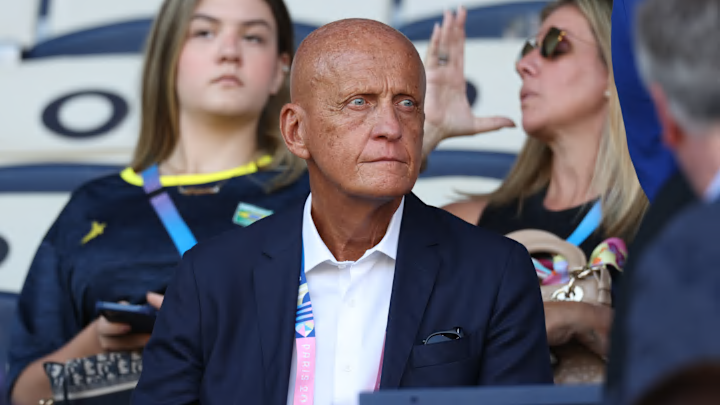There were many controversial World Cup moments before FIFA introduced technology to help their officials. There was the controversial goal by Geoff Hurst of England in the final against West Germany in 1966; it's still not clear if the whole of the ball was over the line or not, but with today's advancements, the referee would have no doubt whether it crossed the line in real time.
There was also Diego Maradona's handball against England for Argentina in the 1986 World Cup, where he punched the ball past Peter Shilton and into the net. Maradona's "Hand of God" moment would have been ruled out by the video assistant referee.
The turning point came at the 2010 World Cup, when Frank Lampard's shot from range was ruled no goal despite going over the line in a match against Germany. FIFA instituted major changes ahead of 2014, and now goal-line technology is used in most major soccer divisions around the world. Just four years later, VAR arrived on the international stage.
There are always new innovations being developed, though, and FIFA plans to use the Club World Cup this summer to improve the technology that they use in the game. These include live referee POV footage, enhanced offside technology powered by AI and real-time transparency tools in stadiums.
FIFA planning to test out new officiating technology at Club World Cup
Chairman of the FIFA Referees Committee Pierluigi Collina said in a press conference on Zoom: "VAR seems to have existed since forever, we had the first match in 2016, so less than ten years ago. From there, we went to this level where technology VAR is implemented in almost all top competitions around the world. We have implemented changes, we have developed the technology, we have introduced something new."
The legendary former referee, who officiated the 2002 World Cup final between Brazil and Germany, added that the goal isn't to eventually supplant human referees. Instead, it's to make their jobs easier: "The presence of assistant referees is still critical in a game," Collina said. "Artificial intelligence and semi-automated offside technology intervene only when there is a positional offside, and the player in the offside technology touches the ball."
FIFA is using the Club World Cup as something of a testing ground, a way to experiment with new technologies in a lower-stakes environment to determine whether they can be implemented at a World Cup in the future.
"The idea here is especially with the ref body camera, but also with the advanced semi-automated offside, that the results from the test will be given back and reported to the IFAB (International Football Association Board) and then it will be IFAB's decision whether this will be something good for the game," said FIFA Director of Innovation Johannes Holzmüller.
The referees will wear body cameras to provide the POV footage. This will also help protect the referees from potential abuse from players. Their footage will be available to use by the tournament's broadcaster, DAZN.
On screens in the stadiums, fans will also be able to see the monitor that referees use to make decisions. This will lead to less confusion in real time, but could also cause outrage amongst supporters if the decision goes against their team.
New SAOT technology has also been tested out at the 2024 FIFA Intercontinental Cup and the organization's youth tournaments. The new tech is designed to make the offside decisions much faster; it will notify the assistant referees first so they can put their flags up.
We have seen in the Premier League how much time some of these offside calls can take, so the new technology will be welcome for supporters. Assistant referees being able to flag for offside early will also lead to fewer chances of injuries, such as the one Nottingham Forest's Taiwo Awoniyi suffered when the official was not able to act promptly.
Data from the tournament will also be collected by artificial intelligence. Substitutions will be processed by coaching teams on a tablet for the first time. Referees will also announce their decisions over the tannoy in the stadiums. Goalkeepers will only be able to hold onto the ball for eight seconds, and the officials will be stricter in implementing this rule. If a keeper exceeds this limit, then a corner will be awarded to their opponents.
Also, if a player accidentally touches the ball twice when scoring a penalty, they will be allowed to retake their kick. And if a manager accidentally touches the ball in the field of play, then he will now not be sent off, but only an indirect free-kick will be given.
